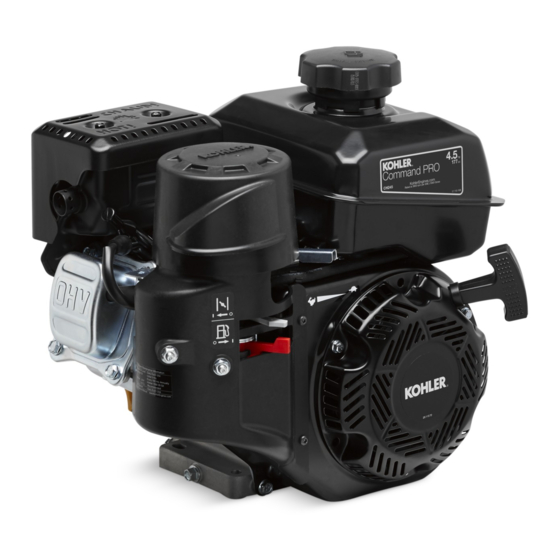Kohler Command PRO CH395 Посібник користувача - Сторінка 5
Переглянути онлайн або завантажити pdf Посібник користувача для Двигун Kohler Command PRO CH395. Kohler Command PRO CH395 11 сторінок. Kohler horizontal crankshaft owner's manual
Також для Kohler Command PRO CH395: Посібник користувача (24 сторінок)

Starting
Carbon Monoxide can cause
severe nausea, fainting or death.
Avoid inhaling exhaust fumes.
Never run engine indoors or in
enclosed spaces.
Engine exhaust gases contain poisonous
carbon monoxide. Carbon monoxide is
odorless, colorless, and can cause death if
inhaled.
Rotating Parts can cause severe
injury.
Stay away while engine is in
operation.
Keep hands, feet, hair, and clothing away
from all moving parts to prevent injury. Never
operate engine with covers, shrouds, or
guards removed.
NOTE: Choke position for starting may vary
depending upon temperature and other
factors. Once engine is running and
warm, turn choke to OFF position.
NOTE: Extend starter cord periodically to
check its condition. If cord is frayed
have it replaced immediately by a
Kohler authorized dealer.
NOTE: Do not crank engine continuously for
more than 10 seconds. Allow a 60
second cool down period between
starting attempts. Failure to follow
these guidelines can burn out starter
motor.
NOTE: If engine develops suffi cient speed to
disengage starter but does not keep
running (a false start), engine rotation
must be allowed to come to a complete
stop before attempting to restart
engine. If starter is engaged while
fl ywheel is rotating, starter pinion and
fl ywheel ring gear may clash, resulting
in damage to starter.
1. Turn fuel shut-off valve to ON position (if
equipped).
2. Turn engine on/off switch to ON position (if
equipped).
3. Start engine as follows:
Cold engine: Place throttle control midway
between SLOW and FAST positions. Place
choke control into ON position.
Warm engine: Place throttle control midway
between SLOW and FAST positions. Return
choke to OFF position as soon as engine
starts. A warm engine usually does not
require choke on.
17 590 23 Rev. --
WARNING
WARNING
KohlerEngines.com
4. Retractable Start: Slowly pull starter handle
until just past compression-STOP! Return
starter handle; fi rmly pull straight out to avoid
excessive rope wear from starter rope guide.
Electric Start: Activate starter switch.
Release switch as soon as engine starts. If
starter does not turn engine over, shut off
starter immediately. Do not make further
attempts to start engine until condition is
corrected. Do not jump start. See your Kohler
authorized dealer for trouble analysis.
5. Gradually return choke control to OFF
position after engine starts and warms up.
Engine/equipment may be operated during
warm up period, but it may be necessary to
leave choke partially on until engine warms
up.
Cold Weather Starting Hints
1. Use proper oil for temperature expected.
2. Disengage all possible external loads.
3. Use fresh winter grade fuel. Winter grade
fuel has higher volatility to improve starting.
Stopping
1. If possible, remove load by disengaging all
PTO driven attachments.
2. If equipped, move throttle control to slow or
idle position; stop engine.
3. If equipped, close fuel shut-off valve.
Angle of Operation
Refer to operating instructions of equipment
this engine powers. Do not operate this engine
exceeding maximum angle of operation; see
specifi cation table. Engine damage could result
from insuffi cient lubrication.
Engine Speed
NOTE: Do not tamper with governor setting to
increase maximum engine speed.
Overspeed is hazardous and will void
warranty.
High Altitude Operation
If this engine is operated at an altitude of 4000
ft. (1219 meters) or above, a high altitude
carburetor kit is required. To obtain high altitude
carburetor kit information or to fi nd a Kohler
authorized dealer, visit KohlerEngines.com or
call 1-800-544-2444 (U.S. and Canada).
This engine should be operated in its original
confi guration below 4000 ft. (1219 meters).
Operating this engine with the wrong engine
confi guration at a given altitude may increase
its emissions, decrease fuel effi ciency and
performance, and result in damage to the
engine.
EN
5
